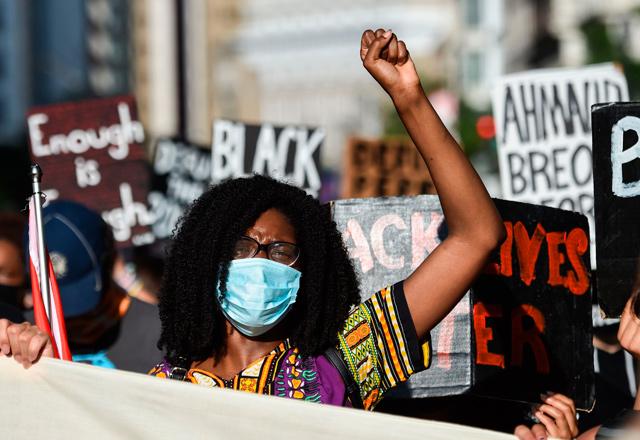- International News
- Sun-2020-06-21 | 04:40 pm

Demonstrations were held in Atlanta, Chicago, Los Angeles, New York and Washington against a backdrop of weeks of protests fuelled by the deaths of African Americans at the hands of police.
In a stark illustration of the tensions roiling the nation, President Donald Trump issued a solemn White House statement commemorating Juneteenth, while also threatening protesters on Twitter ahead of his controversial rally in Tulsa, Oklahoma on Saturday.
Juneteenth marks the day — June 19, 1865 — when a Union general arrived in Galveston, Texas and informed slaves that they were free — two months after the Civil War had ended and two-and-a-half years after president Abraham Lincoln had issued the Emancipation Proclamation.
The date is generally celebrated with prayer services and family gatherings, but comes this year amid a national soul-searching over America’s legacy of racial injustice.
The United States has been gripped by daily "Black Lives Matter” protests since the May 25 death of George Floyd, a 46-year-old black man killed by a white police officer in Minnesota.
Late on Friday a statue of Confederate general Albert Pike was torn down by demonstrators in the capital and set on fire, in an act labelled a "disgrace” by Trump.
"The DC police are not doing their job as they watch a statue be ripped down and burn. These people should be immediately arrested,” Trump tweeted.
Earlier, several thousand demonstrators marched across New York’s Brooklyn Bridge to Manhattan, chanting the names of black men and women killed by police in recent years.
"This year the entire country has had a reckoning,” said protester Tabatha Bernard, 38, voicing support for growing calls for Juneteenth to be declared a national holiday.
"It’s up to us to keep this going until we have change.”
Protesters in Atlanta, where a police officer was charged with murder this week for shooting a black man in the back, marched on the Georgia State Capitol.
More gathered in Washington outside the Lincoln Memorial and near the White House, while thousands marched in Chicago and danced at festive rallies in South Los Angeles.
Democratic presidential candidate Joe Biden, who has a solid lead over Trump in the latest polls, said Juneteenth reminded Americans "that our country is capable of the worst violence and injustice but it also has an incredible capacity to be reborn anew”.
Meanwhile, US Secretary of State Mike Pompeo said Saturday a UN Human Rights Council vote condemning racism amounted to hypocrisy.
Pompeo defended the recent discussion on race relations in America as a sign of a healthy democracy, and said the council should focus on what he called systemic racial disparities in member countries such as Cuba and China.
"The council’s decision to vote yesterday on a resolution focusing on policing and race in the US marks a new low,” Pompeo said in a statement.
The council took the vote after a debate prompted by protests in the US triggered by the death at police hands of African American George Floyd.
However, a specific mention of racism and police brutality in the US was removed.
This sparked outrage from rights groups, which accused Washington and its allies of lobbying heavily to revise the text — a charge to which the US mission in Geneva declined to respond.
The United States, which had complained of being singled out in the initial text, withdrew from the council in 2018 and was not present on Friday.
In his statement Saturday, titled "On the Hypocrisy of UN Human Rights Council”, Pompeo said discussion in the US about race following the death of Floyd "is a sign of our democracy’s strength and maturity”.
"If the council were serious about protecting human rights, there are plenty of legitimate needs for its attention, such as the systemic racial disparities in places like Cuba, China and Iran,” he said.
"If the council were honest, it would recognize the strengths of American democracy and urge authoritarian regimes around the world to model American democracy and to hold their nations to the same high standards of accountability and transparency that we Americans apply to ourselves,” Pompeo added












